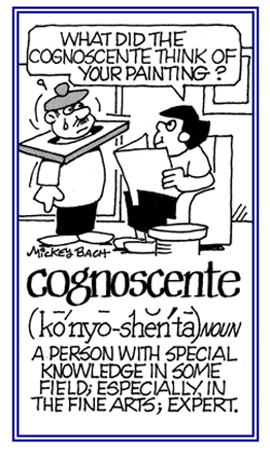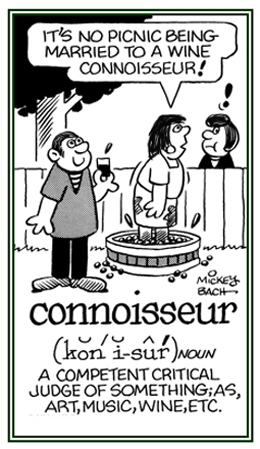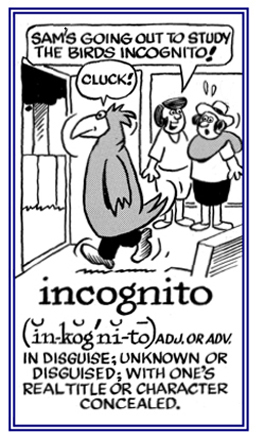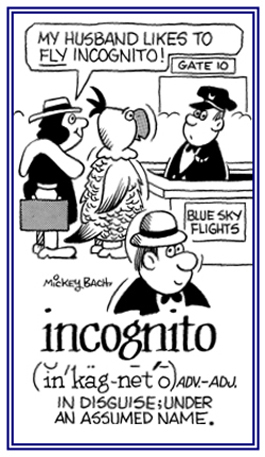cogni-, cogn-, cognosc-
(Latin: know, learn; comprehend, perceive)
1. An expert who has a superior and specialized knowledge or highly refined taste; especially, in the fine arts: There were three cognoscenti in the art museum who were the judges of the oil paintings presented by the various artists.
2. Certain people who have superior knowledge and understanding of a particular field; especially, in literature and the world of fashion: A cognoscente, specializing in the latest trends of clothing, was invited to the women’s group to talk about the newest vogue in coats for the winter season.
3. Etymology: from Italian; literally, "person who knows"; from Latinized form of conoscente, from Latin cognoscent-, present participle of cognscere, "to know".

© ALL rights are reserved.
Go to this Word A Day Revisited Index
2. Certain people who have superior knowledge and understanding of a particular field; especially, in literature and the world of fashion: A cognoscente, specializing in the latest trends of clothing, was invited to the women’s group to talk about the newest vogue in coats for the winter season.
3. Etymology: from Italian; literally, "person who knows"; from Latinized form of conoscente, from Latin cognoscent-, present participle of cognscere, "to know".

Go to this Word A Day Revisited Index
so you can see more of Mickey Bach's cartoons.
cognoscible (adjective), more cognoscible, most cognoscible
A reference to that which is capable of being known: Since the article was published in the local newspaper, and therefore being congnoscible information, the readers were able to learn about the accident which took place in their town the previous day.
cognoscitive (adjective), more cognoscitive, most cognoscitive
Referring to having the ability to know or to discover information and to utilize it during a learning process: Because the elementary-school students had learned to read and to write, they possessed the cognoscitive skills to write about many topics during the year.
1. Someone with informed and discriminating taste: Mark and Madeline were connoisseurs of fine wines.
2. Those who are especially competent in sharing critical judgments in an art, particularly one of the fine arts, or in matters of taste: Madeline was a connoisseur of modern-artistic portraits.
3. A discerning judge of the best in any field: Bert was a connoisseur of race horses, having been in this profession for more than 30 years.
4. Etymology: from Old French connoisseor; from connoistre, "to know"; from Latin cognoscere, "to learn, to know, to recognize"; from com-, "with, together" + gnoscere, "to recognize".

© ALL rights are reserved.

© ALL rights are reserved.
Go to this Word A Day Revisited Index
2. Those who are especially competent in sharing critical judgments in an art, particularly one of the fine arts, or in matters of taste: Madeline was a connoisseur of modern-artistic portraits.
3. A discerning judge of the best in any field: Bert was a connoisseur of race horses, having been in this profession for more than 30 years.
4. Etymology: from Old French connoisseor; from connoistre, "to know"; from Latin cognoscere, "to learn, to know, to recognize"; from com-, "with, together" + gnoscere, "to recognize".


Go to this Word A Day Revisited Index
for a list of additional Mickey Bach illustrations.
A love of or a taste for artistic creations: Modern connoisseurship often involves a desire to visit museums and art galleries because they have so many aesthetic creations.
Connoisseurships are usually the results of evaluating works of art on the basis of how attractive they are considered to be.
A connoisseurship involves making judgments that are based on intuition; however, they must also have a foundation in a thorough understanding of the work itself.
A woman or girl whose identity is disguised or concealed: The reporters, Jill and Jane, were two incognitas for their local newspaper when they went to try out the new restaurant that had just opened.
incognite (adjective) (no comparatives)
A reference to something which or someone who is unknown: Flowers were sent to Linda by an incognite person, evidently a secret admirer.
incognitive (adjective), more incognitive, most incognitive
Relating to the mental process of being uninformed or being unable to recognize someone or something: Because the elderly lady was blind, she was considered to be incognitive, or not able to perceive where she was on the street, and therefore she had a member of her family to lead her to places.
incognito (in" kahg NEE toh, in KAHG ni toh") (adjective), more incognito, most incognito
Referring to someone who uses a disguise or a false name in order to be unidentifiable: The people who came to Joe's Halloween Party were incognito guests because they dressed in strange costumes and face masks in order to conceal themselves from each other.

© ALL rights are reserved.
Go to this Word A Day Revisited Index

Go to this Word A Day Revisited Index
so you can see more of Mickey Bach's cartoons.
incognito (adverb), more incognito, most incognito
Characteristic of how someone acts or travels in disguise in order to be unrecognizable: The well-known actress often traveled incognito because she didn't want anyone asking for her autograph or trying to carry on a conversation with her.

© ALL rights are reserved.
Go to this Word A Day Revisited Index

Go to this Word A Day Revisited Index
so you can see more of Mickey Bach's cartoons.
Lacking perception or recognition: The incognizance of the laws for driving vehicles cannot be an excuse for driving too fast past a school or kindergarten.
incognizant (in KAHG ni zuhnt) (adjective), more incognizant, most incognizant
Without being informed, having no apprehension, or being unaware and unconscious of what is going on: Greg was sleeping and incognizant of the thieves who entered his house during the night.
incognoscent (adjective), more incognoscent, most incognoscent
1. Descriptive of having a lack of knowledge or being ignorant: Jackie was quite incognoscent that she had an appointment with the dentist and so she missed the check-up.
2. Pertaining to being unaware or not conscious of what else is going on: Susan was watching a crime movie on TV and was incognoscent that her mother was calling her for dinner.
2. Pertaining to being unaware or not conscious of what else is going on: Susan was watching a crime movie on TV and was incognoscent that her mother was calling her for dinner.
The quality or condition of being beyond comprehension or knowing: No matter how hard Jacob tried, his incognoscibility regarding how to use the new computer program was more and more frustrating for him and so he had to call a specialist to unravel his incognoscibilities.
incognoscible (adjective), more incognoscible, most incognoscible
1. Pertaining to being uncertain or beyond recognition: The dead body had been in the lake for so long that it was quite incognoscible and so no one was able to identify it.
2. A reference to something that is incapable of being perceived or understood: In the advanced math class at college, some of the topics the professor was talking about were very incognoscible for some members of the class because they couldn’t understand what he was presenting to them.
2. A reference to something that is incapable of being perceived or understood: In the advanced math class at college, some of the topics the professor was talking about were very incognoscible for some members of the class because they couldn’t understand what he was presenting to them.
Inter-related cross references, directly or indirectly, involving word units meaning "know, knowledge; learn, learning": discip-; gno-; histor-; intellect-; learn, know; math-; sap-; sci-; sopho-.


